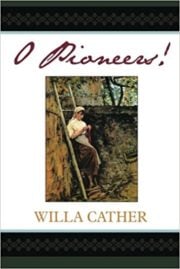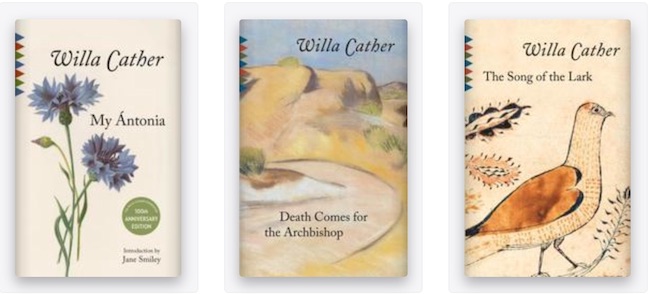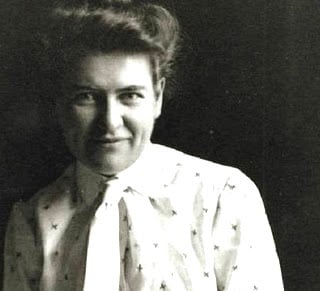Quotes from O Pioneers! by Willa Cather
By Jordan St. Clair-Jackson | On November 5, 2018 | Updated June 28, 2024 | Comments (0)

The 1913 novel O Pioneers! by Willa Cather is written in the spare yet lyrical prose that came to define her style. One of her earliest novels, and one of the most successful on many levels, it explores themes of fate, love, perseverance, family ties, and community.
The novel’s central character, Alexandra Bergson, is the daughter of Swedish immigrants who pioneer the harsh, unforgiving land of the Nebraska prairie.
In an unusual move, Alexandra’s father tasks her, in his dying wish, with taking the lead on managing the family farm. He tells his sons to honor the decisions of their sister. Of course, a novel doesn’t move along without conflict, but Cather delivers it without the sentimentality and overwrought prose characteristic of novels of that era.
More than one hundred years after its publication, O Pioneers! still resonates, speaking to the virtues of dignity, hard work, sacrifice, and loyalty. It’s only right and fitting that Alexandra Bergson, a feminist heroine for the ages, finds a route to happiness and contentment. Here are quotes from O Pioneers! that demonstrate the gentle wisdom of this novel.
. . . . . . . . . .
“Freedom so often means that one isn’t needed anywhere.”
. . . . . . . . . .
“I like trees because they seem more resigned to the way they have to live than other things do. I feel as if this tree knows everything I ever think of when I sit here. When I come back to it, I never have to remind it of anything; I begin just where I left off.”
. . . . . . . . . .
Learn more about O Pioneers! by Willa Cather
. . . . . . . . . .
“I’ve seen it before. There are women who spread ruin through no fault of theirs, just by being too beautiful, too ful of life and love. They can’t help it. People come to them as people go to a warm fire in winter.”
. . . . . . . . . .
“People have to snatch at happiness when they can, in this world. It is always easier to lose than to find.”
. . . . . . . . . .
“There are only two or three human stories, and they go on repeating themselves as fiercely as if they had never happened before; like the larks in this country, that have been singing the same five notes over for thousands of years.”
. . . . . . . . . .
“It’s awfully easy to rush into a profession you don’t really like, and awfully hard to get out of it.”
. . . . . . . . .
“I might as well try to will the sunset over there to my brother’s children. We come and go, but the land is always here. And the people who love it and understand it are the people who own it — for a little while.”
. . . . . . . . . .
“There is often a good deal of the child left in people who have had to grow up too soon.”
. . . . . . . . . .
“The trouble is you almost have to marry a man before you can find out the sort of wife he needs; and usually it’s exactly the sort you are not. Then what are you going to do about it?”
. . . . . . . . . .
“It’s queer what things one remembers and what things one forgets.”
. . . . . . . . . .
“I waste a lot of time pretending to people, and the joke of it is, I don’t think I ever deceive anyone. There are too many of my kind people know us on sight.”
. . . . . . . . . .
“Everywhere the grain stood ripe and the hot afternoon was full of the smell of the ripe wheat, like the smell of bread baking in an oven. The breath of the wheat and the sweet clover passed him like pleasant things in a dream.”
. . . . . . . . . .
“He had got into the habit of seeing himself always in desperate straits. His unhappy temperament was like a cage; he could never get out of it; and he felt that other people, his wife in particular, must have put him there. It had never more than dimly occurred to Frank that he made his own unhappiness.”
. . . . . . . . . .

. . . . . . . . . .
“I’ve found it sometimes pays to mend other people’s fences”
. . . . . . . . . .
“… he felt that men were too weak to make any mark here, that the land wanted to be let alone, to preserve its own fierce strength, its peculiar, savage kind of beauty, its uninterrupted mournfulness.”
. . . . . . . . . .
“The years seemed to stretch before her like the land; spring, summer, autumn, winter, spring; always the same patient fields, the patient little trees, the patient lives; always the same yearning, the same pulling at the chain—until the instinct to live had torn itself and bled and weakened for the last time, until the chain secured a dead woman, who might cautiously be released.”
. . . . . . . . . .
“It was to him a very strange and perplexing place, where people wore fine clothes and had hard hearts.”
. . . . . . . . . .
“Above Marie and Emil, two white butterflies from Frank’s alfalfa field were fluttering in and out among the interlacing shadows; diving and soaring, now close together, now far apart; and in the long grass by the fence the last wild roses of the year opened their pink hearts to die.”
Learn more about Willa Cather
. . . . . . . . . .
“There is something frank and joyous and young in the open face of the country. It gives itself ungrudgingly to the moods of the season, holding nothing back. Like the plains of Lombardy, it seems to rise a little to meet the sun. The air and the earth are curiously mated and intermingled, as if the one were the breath of the other. You feel in the atmosphere the same tonic, puissant quality that is in the tilth, the same strength and resoluteness.”
. . . . . . . . . .
“Yes, there would be a dirty way out of life, if one chose to take it. But she did not want to die. She wanted to live and dream — a hundred years, forever! As long as this sweetness welled up in her heart, as long as her breast could hold this treasure of pain!”
. . . . . . . . . .
“How many times we have walked this path together, Carl. How many times we will walk it again! Does it seem to you like coming back to your own place? Do you feel at peace with the world here?”
. . . . . . . . . .
“I think we shall be very happy. I haven’t any fears. I think when friends marry, they are safe. We don’t suffer like — those young ones.”
. . . . . . . . . .

Willa Cather books on Bookshop.org*
Willa Cather page on Amazon*
. . . . . . . . . .
*These are Bookshop Affiliate and Amazon Affiliate links. If the product is purchased by linking through, Literary Ladies Guide receives a modest commission, which helps maintain our site and helps it to continue growing!


Leave a Reply